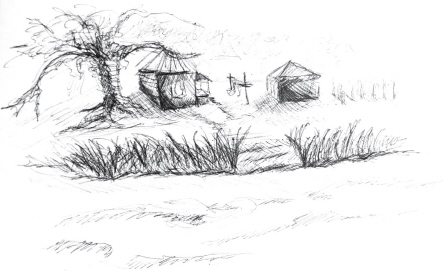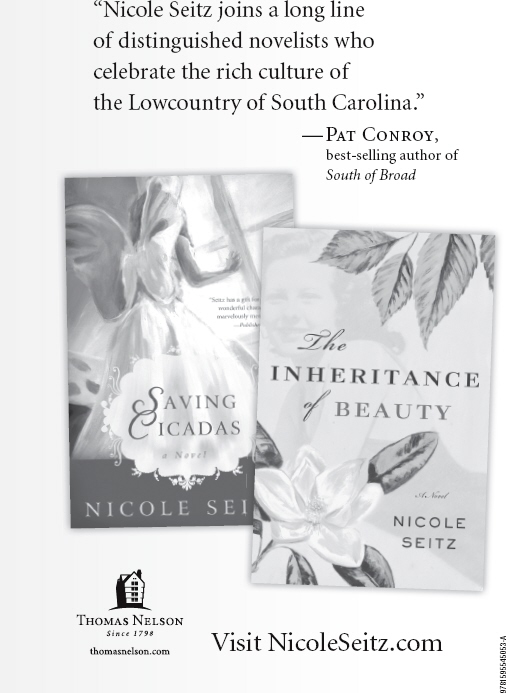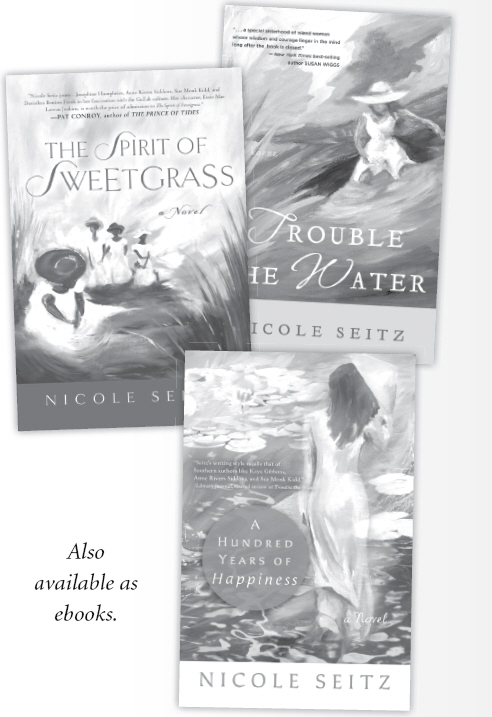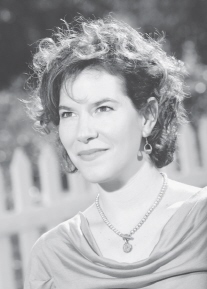Beyond Molasses Creek (30 page)

Now to some delightfully unexpected “soul mates” I've met along the way: To author Shellie Rushing Tomlinson, words can't explain what your friendship and prayers have meant to me in the writing of this book. Thank you for understanding me fully and supporting my efforts from all the way in Louisiana. To Ric Cochran, radio personality extraordinaire in Charleston, West Virginia, what can I say? For someone I've never even met in person, you've had quite an impact on my life as a writer and person. You inspire me to do bigger, better things, and I can't thank you enough for being such a gracious example of an honorable man. I am blessed to call you my friend.
To my familyâmy parents, in-laws, children, siblings, aunts, uncles, nieces, and nephewâyou are a constant source of inspiration and the foundation on which I stand. I love you and thank God for you. To my mother, my reader, my dear friend, thank you for always lifting me up and urging me to keep going. And to my husband, Brian, you are so gracious and understanding of my need to write. Every day I know how blessed I am to have you in my life. I'm sure the people who enjoy my books thank you as well. You have my unending love and respect.
Now to my Father in heaven, thank you for the words, for the mountains you've moved, and for the prayer partners you've put in my path. I love this journey we're on together and can't wait to see where we go next.

1. In the prologue, Ally admits, “Sometimes stepping back in time is the only way for a girl to move forward.” Is this something you've experienced in your own life? Do you agree or disagree with the statement?
2. The themes of “coming home” and “escape” are threaded throughout
Beyond Molasses Creek
. Discuss each of these concepts with regards to Ally and Sunila.
3. Both Ally and Sunila long to be free in their own ways. How does this search for freedom affect their lives? What brought them to a “captive” state in search of freedom? Is all captivity imposed, or is it possible to keep oneself in captivity?
4. Education is important to Vesey and later to Sunila. Why? How can education be a world-changer?
5.
Beyond Molasses Creek
confronts diversity and prejudice in both the American South and in Nepal. Have you ever witnessed discrimination against a person because of their race, religion, or beliefs? What changes have you seen in your lifetime with regards to discrimination?
6. Ally is an artist and keeps a sketchbook to chronicle the world around her. Is it possible for one person's art to become the lifeline to another? Do you think art is made for oneself or for those around us?
7. How does the setting of Molasses Creek and the South Carolina lowcountry in this book contribute to both the harming and the healing of those who live there?
8. Discuss the relationship of Ally and Vesey when they were children. How and why does it change as they get older? What outside influences affect that relationship? What about internal influences?
9. In many ways,
Beyond Molasses Creek
is the story of trans-formative Love and Loss. Whose love in this book has the ability to transform? Is Love or Loss the victor?
10. Ally spends many of her latter years traveling the world and collecting stone statues for her garden. Discuss the symbolism of this garden. Can people (or stones or something else) become gods in our lives?
11. Sunila's character explores the age-old concepts of genetics vs. rearing. How do her genetics play into her survival in contrast to her upbringing? Have you ever seen someone thrive because of some internal strength even in the midst of poor circumstances?
12. To which main character do you most relateâVesey, Ally, or Sunila? By the end of the book, which secondary character became most dear to you? Ally's father (Doc Green), Margaret, Graison, or Mr. Assai?
13. Did the dream/theme of the elephants and the white bird fly right over your head, or do you see the symbolic importance to the book? Several characters in this book “cross over”. Discuss.
14. Doc Green named his cat “Kat” or “Kathmandu”. Why would he do this after what happened there? Do you ever keep painful reminders of your past close at hand?
15. Discuss the importance of lying and truth-telling in this novel. Ally catches her father telling a lie. Or does she?


AN EXCERPT FROM
The Inheritance of Beauty
Annie
It started when Miss Magnolia got this great big package in the mail on the very same day Mister Joe moved in, just a few doors down from her. At the time, I didn't put two and two together, but I know better now. Something was different about that very morningâthe air was cool and crisp on an August day, the birds were quiet, and the cat was prowling some other corner of the house, not the first floor like it usually did . . . waiting for some old folk to die.
Nobody died in Harmony House that day the man come hightailing in the front door, carrying that package all in a hurry. None of us aides had ever seen anything that big, so we was all eyes, you know, wondering who it could be for. I seen it said
Mrs. Magnolia Black Jacobs
, and I remember feeling pride 'cause she was one of my own and being so surprised 'cause I never known she was a Black. In the two years I'd known her, she'd just been Mrs. Jacobs, Miss Magnolia, George's wife, to me. That package hinted she had a life beforeâbefore Harmony House, before age came and stole her away, before she ever married George Jacobs and had a family with him.
I walked with the package man back to room 101 and asked what was in it. “Don't know,” he said. “Maybe some kind of painting?” It was a large, rectangular thing. The address was from New York City, but there weren't a sender's name.
I opened the door and found Mister George and Miss Magnolia still sleeping sound in their bed. It had been a rough go for them, 'specially the last six months, for Miss Magnolia losing her mind with each pin stroke, losing her independence, her ability to communicate. But for Mister George, I declare, it was even worse. For a while, his wife seemed to be forgetting everything and everybody. Even him, her husband of seventy-some years.
After the man helped me heft that package into the room, I leaned it up against the wall. I tiptoed on over to the bed, and Mister George stirred. “Goo-ood mornin', Mister George,” I sang in my brightest, happiest voice, wanting to wake him with a Southern smile. He deserved some sweetness.

George
I open my eyes and see Miss Annie hovering over Maggie, her large frame blocking the sunlight, her face hard to wake up to. I've been spoiled by my lovely wife. “Good mornin'? Sheesh, maybe for youâyou got all your teeth.” I reach over and fumble, trying to find my glass.
“Over to the right a little,” says Annie. As I reach into the water, I realize what a stupid thing I just said. Miss Annie, the colored woman who takes care of my wife, has terrible teeth, all crooked and small and yellow, like little bits of corn left out in the field too long. And a face like a beat-up frying pan, but sweet like an angel.
Think, George, before you speak
. That part's never come easy for me, thinking. I pop my teeth in.
“Ah gee, I didn't mean . . . I'm sorry, Annie.”
“For what? I ain't understood a thin' you said, what with your no-tooth self.” She winks at me. “You sleep good?”
“Yeah, reckon. Fair to middlin'.”
“Mornin', Miss Magnolia,” Annie sings. “How we doin' today? Rise and shine. The Lawd done give us a new day together.”
I turn over because I don't really know how my wife is going to react to being woken up. She doesn't know me anymore, and I'm pretty sure she doesn't know Annie either, and I just don't want to see a whole production right now. It's something that's hard to prepare for, and you never know when it might happen. Not too long ago when Maggie could still speak, Miss Annie was putting her to bed one night, and she turned and looked at me and said, “Where's he sleeping?”
“Right here, in the bed.”
“With me?” said Maggie.
“Of course,” said Annie.
“The hell he is.”
My wife had never used a profane word in all her years, but it's not what bothered me. I was a stranger now, just like everybody else.
Miss Annie knows enough to leave me alone every now and again. Occasionally she finds me lying on a bed of white towels in the bathtub, crusty tracks on my face from crying half the night. It's been hard. I won't lie.
I sit up slow and hang my legs off the bed, struggle to find my slippers. I rub the back of my head and my whiskers, my unshaven face. And I tell her about my dream, hoping to smooth over any unpleasantness on the other side of the bed.
“Miss Annie, last night I was young again. How 'bout that.”
“That right?”
“Yes, ma'am. Old George. Dreamt I was sitting at this watering hole we used to have near the farm. I'd sit there as a boy, eight, nine, ten . . . with crickets or worms on my hook.
I'd get bream on a good day, catfish any other. Sometimes we'd sell 'em at the store, Jacobs Mercantile. In this dream I had, there was somethin' on the line. It was a big somethin'. I was pullin', haulin' it in. The water was dark and I couldn't see, but I was pullin' and pullin' and pullin' andâ”
“Well, what it was?”
I realize my hands are stretched out like I'm fishing, so I stop. I turn and watch Annie helping my wife sit up, the powder white of her hair like snow on her sweet little head. I miss touching that softness. I miss those shoulders, that body. I miss the woman who knew me. I miss my wife. But I'm not complaining. She's still here, see. That's more than some people can say.

